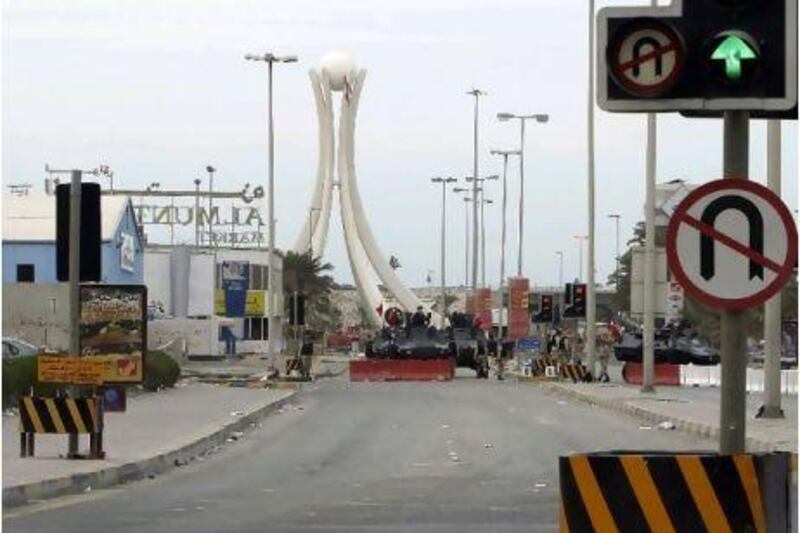Bahrain's stock exchange, its central bank and some banks reopened yesterday in an attempt by the government to bring back normality to the kingdom amid a widening crackdown on protesters.
The stock market resumed trading at its emergency premises as access to Manama's financial hub remained blocked by police.
The index, the smallest and most illiquid in the Arab world, was forced to close on Wednesday after a three-month state of emergency was declared in Bahrain. It could reopen at its Financial Harbour headquarters on Sunday, a spokesman for the exchange said yesterday.
Fitch Ratings cut the sovereign credit rating of Bahrain, which already postponed its planned US$1 billion (Dh3.67bn) government bond, by two notches to "BBB" on Tuesday on soaring political risks.
The strain on Bahrain's $20.6bn economy has sent the cost of insuring the country's debt against default to highs not seen since July 2009 and there were fears a massive capital outflow from the smallest Gulf economy could shake the financial centre further.
Mahmood Akbar, an analyst at Securities & Investment Company, based in Manama, said the "recent downgrade in Bahrain's sovereign debt and spike in credit default swaps reflects more of a sudden investor reflex to the recent political events" than the illiquid stock market.
An average of 10 stocks are traded daily, but yesterday just four stocks were traded on volumes of about 830,000 in total, compared with peaks that averaged 1 million to 1.5 million in the past.
An exodus of office workers has been under way in the past few days as international banks evacuated staff to Dubai and Europe.
Emirates Airline cancelled all flights to Bahrain in light of the political upheaval.
Some banks and financial services also reopened specific branches yesterday. Clashes between security forces and demonstrators intensified earlier in the week and had forced branches to shut down temporarily.
Standard Chartered, the UK bank that earns most of its profit in Asia and employs 500 people in Bahrain, reopened two of its seven branches in the kingdom yesterday and aimed to open the rest soon after, Bloomberg News reported.
One of HSBC's four branches was opened to customers yesterday, but the bank said evacuation assistance to the families of international employees was being offered. Seven families had left Bahrain as a result.
"It doesn't make a real difference for [international banks] because they are only physically located in Bahrain but most activities take place in their back office in Dubai or elsewhere in the world," said Raed Himmo, a banker speaking from his home in Manama.
The reopening of local bank branches yesterday also coincided with Bahrain's central bank resuming operations. It was also forced to shut along with the most other financial organisations on Wednesday.
Local banks rely on the central bank to provide basic banking services such as cheque clearing and bank transfers.
The central bank "is fully prepared to co-operate with all the banks … to assure the continued operation of banks and that they are able to meet the needs of individuals customers and institutions," it said.
The UK's foreign office has called on Britons "without a pressing reason to remain, to leave by the available commercial means if it is safe to do so".
The US state department has "strongly" urged US citizens in the kingdom to avoid demonstrations, and discouraged travel to the country.
Industry has also been heavily hit as a nationwide strike is continuing.
The trade union at Aluminium Bahrain (Alba), however, ended its strike after a meeting with its board members, its chairman Ali al bin Ali said yesterday. "You don't want to be in the middle of a political party situation, it is very dangerous to be in-between," he said.
"The labourers' feeling for a few weeks was to show support for the protests but then it was either the future of Alba or nothing and the future of Alba is the welfare of the labourers," Mr bin Ali said.
An Alba annual meeting will be held on March 30 and the attendance of the trade union is "integral" to the meeting, a spokeswoman for the company said.





